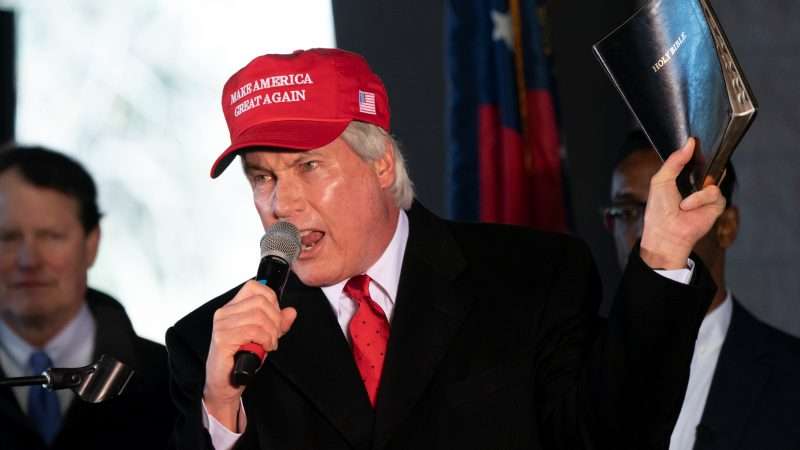
The State Bar of Georgia has asked pro-Trump lawyer L. Lin Wood to undergo a psychiatric examination in response to complaints stemming from his role in promoting bizarre conspiracy theories about the presidential election. Wood is refusing, which may result in the suspension of his license to practice law.
By focusing on Wood’s mental state rather than his conduct, the state bar invites him to portray himself as a First Amendment martyr. A psychiatric evaluation “will violate my First Amendment right to free speech,” Wood told The Atlanta Journal-Constitution. “And if they do that and this harms me, then I will strongly consider suing them, and it will be a significant lawsuit.”
Millions of Americans, including former President Donald Trump and his personal lawyer, Rudy Giuliani, believe (or at least claim to believe) that the election was stolen through an elaborate scheme involving tricky voting machines and massive paper-ballot fraud. That extraordinary popular delusion can be understood as a political phenomenon driven by familiar human frailties such as tribalism and confirmation bias. But it is not in any meaningful sense a medical issue.
Psychiatry routinely treats weird things people say as evidence of mental illness. But if believing wild claims about election fraud were enough to qualify for a psychiatric label, most Republicans would be diagnosable. That premise is not just condescending and pseudoscientific but morally misleading, since it lets people off the hook for endorsing grave allegations with no basis in fact, whether sincerely or cynically.
If Trump’s election fantasy is caused by a mental disorder beyond his control, it would be manifestly unjust to hold him legally accountable for recklessly promoting it, as his impeachment aims to do. Likewise with Giuliani, who last week was hit with a $1.3 billion defamation lawsuit for repeatedly making false claims about the involvement of Dominion Voting Systems in the imaginary plot that supposedly denied Trump a second term. Ditto former Trump campaign lawyer Sidney Powell, whom Dominion sued on January 8.
“Sidney Powell is a crazy person,” the New York Post declared in a December 27 editorial urging Trump to “stop the insanity.” The Post was speaking figuratively. But if its description of Powell is taken literally, meaning that her conspiracy mongering is a product of mental illness, shouldn’t her behavior elicit sympathy and “treatment” rather than anger and lawsuits?
Maybe Wood is a special case. Even in the company of florid fabulists such as Trump, Giuliani, and Powell, he stands out as a purveyor of outlandish allegations. While Trump called Chief Justice John Roberts (along with the rest of the Supreme Court) cowardly and incompetent for turning away lawsuits challenging the election results in battleground states, he did not join Wood in trying to implicate Roberts in murder and pedophilia. And while Trump castigated Vice President Mike Pence for failing to block congressional affirmation of the election results (a power the vice president does not actually have), Wood suggested that Pence should be executed for treason. “Get the firing squads ready,” Wood said in a January 7 Parler post. “Pence goes FIRST.”
Around the same time, Wood was permanently banned from Twitter. His online comments recently prompted one of his best-known clients, Nicholas Sandmann, to terminate their relationship. A Delaware judge this month barred Wood from representing former Trump adviser Carter Page.
“The conduct of Mr. Wood, albeit not in my jurisdiction, exhibited a toxic stew of mendacity, prevarication, and surprising incompetence,” Judge Craig Karsnitz wrote. He called an election lawsuit that Wood filed in Georgia “textbook frivolous litigation” and said a complaint that Wood filed in Michigan “would not survive a law school civil procedure class.”
Karsnitz also noted Wood’s threat against Pence and his claims about Roberts, which the judge called “too disgusting and outrageous to repeat.” More generally, he said Wood’s promotion of baseless election-fraud claims had helped incite the Capitol riot—the same charge that Trump will face when the Senate takes up his impeachment this week.
Such behavior could be cause for disciplinary action, including disbarment. Among other things, the Georgia state bar’s rules prohibit “professional conduct involving dishonesty, fraud, deceit or misrepresentation.” But it’s not clear why a psychiatrist’s opinion is relevant in determining whether Wood violated the bar’s code of professional conduct. Paula Frederick, the state bar’s general counsel, says the demand that Wood be evaluated by a psychiatrist is based on the concern that he “may be impaired or incapacitated.” That concern, in turn, is based on the odd, inflammatory stuff Wood has said.
Wood described his comments about Pence as “rhetorical hyperbole.” But like Trump’s incendiary pre-riot speech, which did not legally qualify as incitement but nevertheless led to his impeachment, Wood’s talk of executing Pence was, at best, grossly irresponsible given the political context. And his defamatory charges against Roberts, which he claimed were based on “information from [a] reliable source,” clearly did not qualify as mere rhetoric. Crazy tweets aside, Wood’s conduct in post-election litigation is obviously relevant in evaluating his professional behavior to the extent that it involved “dishonesty, fraud, deceit or misrepresentation.”
By making an issue of Wood’s mental health, the state bar allows him to complain that it is using psychiatry to punish dissent. “I have done nothing wrong,” he said in a Telegram post last week. “I have only exercised my right of free speech. I will not allow the State Bar to persecute me for doing so and thereby violate my Constitutional rights.”
from Latest – Reason.com https://ift.tt/2L8N6S0
via IFTTT